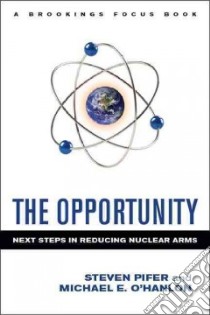- Libreria
- >
- Libri in lingua
- >
- Politica
- >
- Armi nucleari
The Opportunity - 9780815724292
Un libro in lingua di Steven Pifer O'Hanlon Michael E. edito da Brookings Inst Pr, 2012
- € 26.30
- Il prezzo è variabile in funzione del cambio della valuta d’origine
For some observers, nuclear arms control is either a relic of the cold war, or autopian dream about a denuclearized planet decades in the future. But in fact,as Brookings scholars Steven Pifer and Michael O'Hanlon argue in a new book,it is of major relevance to some of the key and urgent security challenges of the day.
Iran, North Korea, and Pakistan dominate the nuclear headlines, and policymakersconstantly try to find the right mix of sanctions, incentives, arms control options, andin some cases, even threats of military force to address the problems. Efforts led bythe Obama administration to pressure Iran not to enrich uranium, North Korea not totest more devices, or Pakistan to slow its arms racing depend on international consensusabout nuclear nonproliferation, nuclear testing, and nuclear weapons reductions.
Then there is Russia. It remains America's chief partner on nuclear arms negotiations,and also a rival in other ways. The Obama administration has had somesuccess in improving U.S.-Russian relations by returning to classic arms control,including the New START Treaty. Those improved relations in turn made it easier toget Moscow to pressure Iran over its nuclear program (and to supply NATO forcesin Afghanistan through the so-called Northern Distribution Network rather thanjust Pakistan). But U.S.-Russian relations remain complex, Moscow is opposed toAmerican plans for missile defense in Europe, and it is not clear how eager Russia isfor any further nuclear arms cuts given its reliance on weapons of mass destructionto protect its long borders.
What is the future of nuclear arms control for the next American president, be ita reelected Barack Obama or a newly elected Mitt Romney? Can there be anothermajor U.S.-Russia arms treaty? Can all the tactical and surplus warheads that haveso far escaped controls be brought into such a framework? Can a modus vivendibe reached between the two states on missile defense? And what of multilateralaccords on nuclear testing and production of fissile materials for nuclear weapons?Pifer and O'Hanlon concisely frame the issues, the circumstances, and the choicesfor a future president and offer their own recommendations as well.
Informazioni bibliografiche
- Titolo del Libro in lingua: The Opportunity
- Lingua: English
- Autori : Steven Pifer O'Hanlon Michael E.
- Editore: Brookings Inst Pr
- Collana: Brookings Inst Pr (Hardcover)
- Data di Pubblicazione: 11 Ottobre '12
- Genere: POLITICAL SCIENCE
- Pagine: 242
- ISBN-10: 0815724292
- EAN-13: 9780815724292


